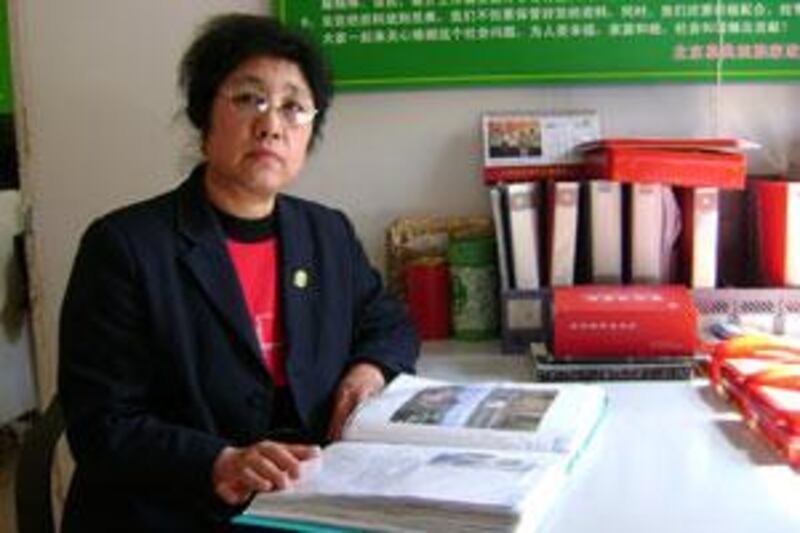BEIJING // In a small backstreet office, an elderly man flicks slowly through a thick folder of profiles, searching for a potential Muslim wife for his son. Mr Yang, a retired newspaper employee, was visiting a matchmaking service for Muslims in the Chinese capital. He said it was not easy to find someone suitable for his 31-year-old son.
"It's quite difficult to find a proper partner because the choices for Muslims are quite narrow," said Mr Yang, 72. "It's hard to find these Muslim girls." But he insists he has an open mind about who could marry his son, who works in a post office. "I don't have much of a requirement," he said. "As long as the two people can get along quite well, there's no problem. The first thing is that the girl must be a Muslim. That's the most important thing."
There are 1,200 Muslims registered at the "Special Kindness Muslim People's Home Economics Service Centre of Peking". Nearly all are members of the Hui people, one of China's 56 officially recognised ethnic groups and, with a population of about 10 million, one of the largest minorities. Man Rong Qin, 56, a former chamber of commerce employee, helps to run the service, based in a modest ground-floor room in Beijing's Muslim quarter a few kilometres south-west of Tiananmen Square. Sometimes single men and women visit the office to look through the profiles of potential spouses. More often their parents do it for them.
Mrs Man, a Hui Muslim, said demand was increasing by 30 per cent a year, with the impersonal nature of big-city life making it more difficult for young people to meet partners. "Society is progressing, so people get more isolated," she said. "It's hard for people to find a proper spouse, especially for Muslims, because there are not too many, so it's necessary for this service to be set up. And there are more Muslim people coming to Beijing."
About 60 per cent of those registered for the service are women, and as most have university degrees, they tend to be better educated than the men who approach the agency. Clients range in age from 24 to 40. A profile lists name, age, height, weight, whether or not the person is a Communist Party member, which region of China he or she is from, their education, monthly income and type of home. There is a brief introduction on each profile. A typical entry for a young woman reads: "Quite filial, very enterprising and quite conservative."
Then there are a few lines of description of the person they are seeking. The same young woman writes: "Has a house and a well-paid job, someone who has Beijing registration and at least a bachelor's degree." Most profiles have a picture attached, ranging from tiny passport headshots to holiday snaps - including one in front of Buckingham Palace in London - and elaborate studio shots. Profiles are also posted online.
Occasionally members of other Chinese Muslim groups visit the agency, among them people from the Salar minority, a Turkic group that numbers 105,000 in the country as a whole. To find clients, Mrs Man visits mosques and gives out business cards during Ramadan and at Muslim festivals, although she insists the agency is run more as a service to the Muslim community than as a commercial enterprise. To register, customers pay 100 yuan ($14.65), plus a further 200 yuan for each person they arrange to meet through the agency. About 200 marriages have resulted from the service since its launch in 2002. "One couple last year, they came here and put 1,000 yuan on the table as a thank you," Mrs Man said.
While many value the agency's help, Wang Na, who manages a nearby company that organises weddings - 80 per cent of them for Muslims - said only a minority of couples to have used her business met through a matchmaking service. "They met through friends or relatives and they married for love," she said, adding that Muslim marriages in Beijing tended to blend traditional Chinese and Islamic styles.
The women typically wear a qipao, also known as a cheongsam, a traditional Chinese dress, along with an Islamic headscarf, which few wear in their profile pictures at the agency. Miss Wang estimates the average marrying age to be about 24, which means for Mr Yang's 31-year-old son the clock is ticking. Mr Yang hopes to find a woman one or two years younger than his son. "Some of these girls, they are in their youth," he said. "Maybe they will not agree [to marry] my son because he's a little bit old in Chinese criteria. When the age gap is large, it's hard for them to get along."
@Email:dbardsley@thenational.ae






